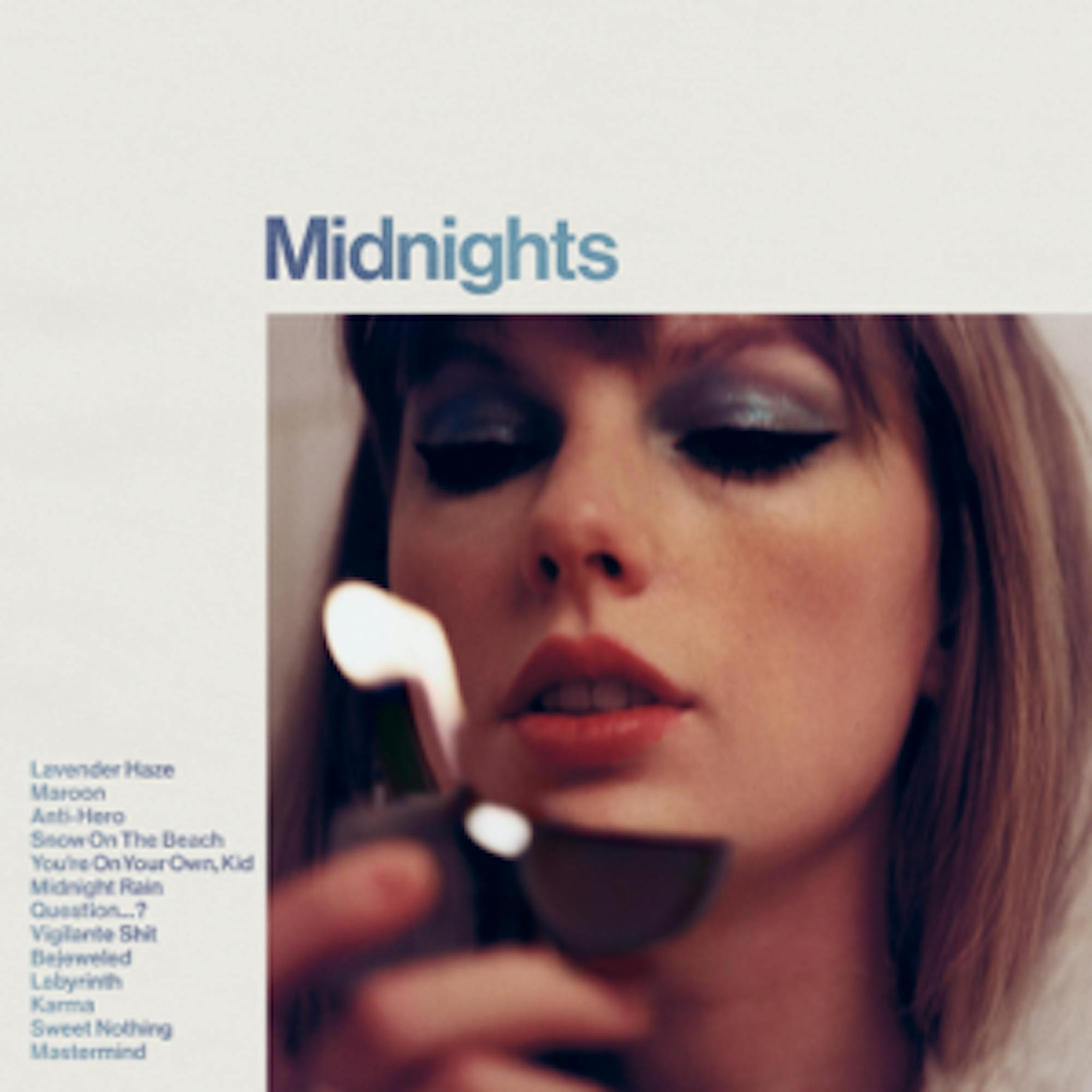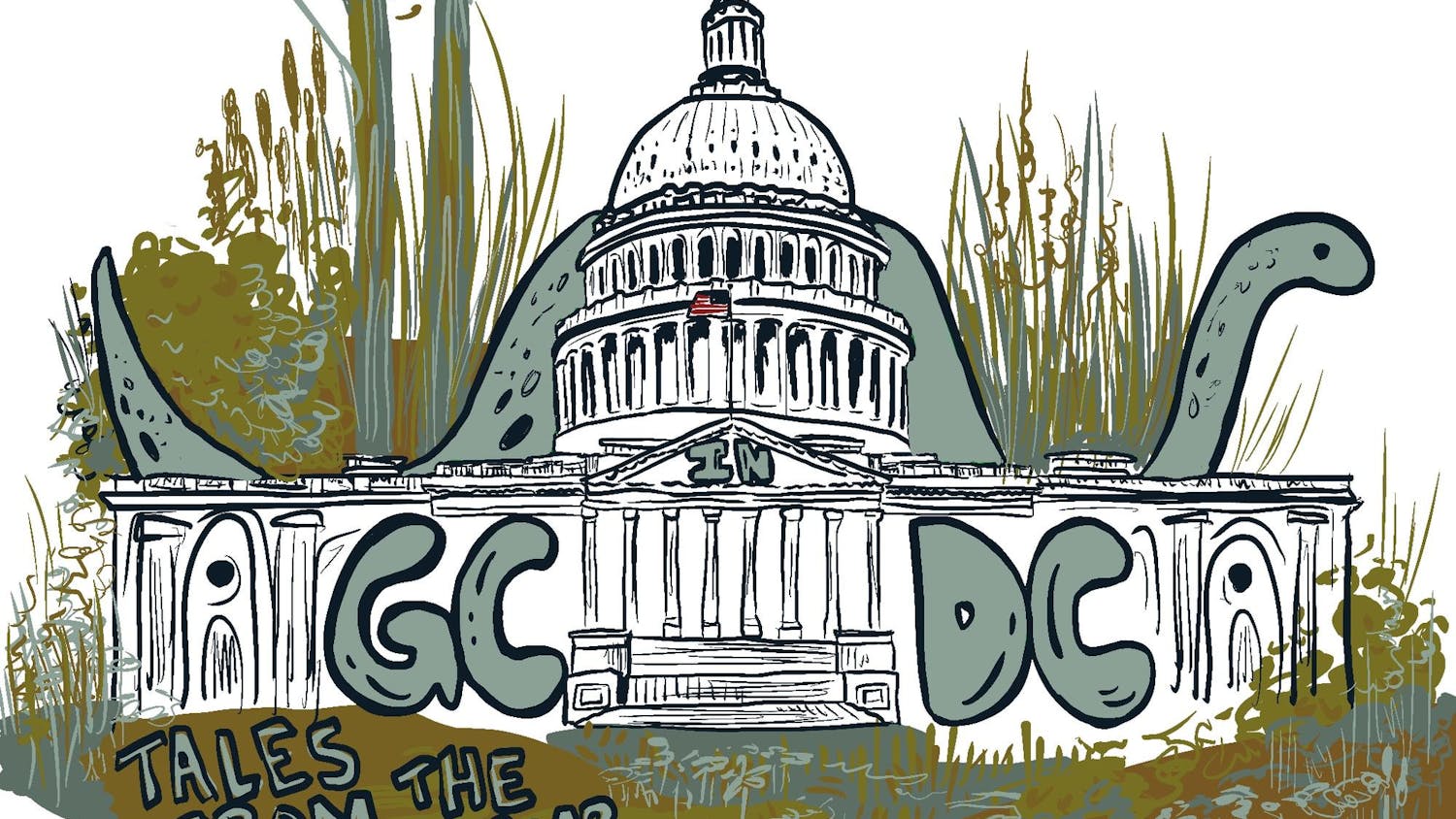Taylor Swift is a mastermind; she said it herself. The effortless sonic transitions from country to pop to alternative records cement the songstress as an unwavering force in the music industry. A country legend who ushered in a new era of crossover country-pop. A pop titan who invigorated the 2010s mainstream scene. An unlikely, but welcomed, alternative experimenter who comforted the masses with quarantine albums to cling to. The groundwork was laid, and it was only a matter of time before Swift returned with her latest effort. With her milestone 10th studio album “Midnights” (2022), Swift returns to her most successful battleground: pop music.
Taking inspiration from the synths and success of “1989” (2014), the darkness of “Reputation” (2017) and, at times, the lyricism of “Folklore” (2020), Swift produced an amalgamation of her most noteworthy endeavors into a new body of work. Featuring 13 standard edition tracks and an assortment of bonus cuts, “Midnights” is a triumphant return to form from the veteran artist.
Dropped without a pre-released single, “Midnights” followed the pattern of Swift’s previous two studio albums. The body feels cohesive, less of a mixture of overplayed pop songs that had their time in the sun well before an album’s release. “Anti-Hero,” the effective lead single, is Swift’s most personally intimate track in recent memory. With much of “Folklore” and “Evermore” (2020) focusing on the imaginings of Swift, “Midnights” recapitulates Swift’s inner monologue into song. Stricken with self-hatred, she laments, “I'll stare directly at the sun, but never in the mirror.” Swift leans into her darker thoughts, oftentimes overlooked even in her most intimate prior works. A shift is evident: Swift is publicizing her own self-identified flaws rather than those spotlighted or purported by the media outlets that have plagued her for most of the past decade.
In “You’re On Your Own, Kid,” Swift dives further into her insecurities. With much of her private life scrutinized by the media, especially during the mid 2010s, Swift has been subjected to relentless criticism. The ever-glaring public eye took a toll on Swift, and she cuts, “I gave my blood, sweat, and tears for this/ I hosted parties and starved my body/ Like I'd be saved by a perfect kiss.” Swift’s honesty is praiseworthy despite the devastation her lyrics illustrate.
Rounding out the most gut-wrenching standard tracks of “Midnights” is “Maroon.” Is this an ode to the title track of her country-pop crossover “Red” (2012)? Swift is left marooned, thrown away with no hope of return. Loving him wasn’t red, it was maroon, darker, emptier and more damaging. Swift’s elevated lyricism is commendable, and it is equally as impressive how many soul bearing tracks she can pack into one record.
There are glimpses of love on this album. As is evident in “Lavender Haze,” Swift glows with affection. She subverts the expectations the public pushes on her relationship and chooses to remain in her blissful bubble of love — a beautiful testament to her relatively mysterious relationship with actor Joe Alwyn. Outside of small bits here and there, the two keep much of their relationship private, which Swift almost boasts about on the track. “Snow On The Beach,” essentially the sister track of “Lavender Haze,” paints another romanticized picture of a relationship. Featuring one of Swift’s idols and songwriting-savant Lana Del Rey, the two piece together an ethereal account of serendipitous attraction. Swift self-described this track as two people falling in love with each other in a “cataclysmic, fated moment,” and she couldn’t have summed it up more accurately. It’s giddily baffling, described by Swift and Del Rey as “flying in a dream / stars by the pocketful.” That rush of exhilaration that escapes words but can be compared to snow falling on the beach, “weird, but f---in’ beautiful.”
Swift rarely missteps, but at times she can come off rather “millennial.” In “Vigilante Shit,” she opens with “draw the cat eye, sharp enough to kill a man.” However comical the line may sound, Swift is unapologetically herself, and that is something to revel in. Swift has been criticized for far more trivial reasons, and though such lyricism cannot be compared to her prior works, this record is authentically autobiographical. What “Vigilante Shit” does have going for it is its reminiscence of “Reputation.” With the class of a more mature Swift, where “Reputation” felt like Swift versus the world, “Vigilante Shit” feels like Swift and the world versus her challengers.
Swift takes extreme liberty with her metaphors in “Karma.” Karma is seemingly everything and anything, with Swift highlighting the positives in her life that are lacking in those of her foes. While the point comes across, it would’ve been lovely to see Swift harness that scorned energy built up over the past decade of scrutiny and truly dig into her enemies. Nonetheless, Swift retains her authenticity and chooses the high road, another laudable feat of her maturity.
“Midnight Rain,” “Question…?” and “Sweet Nothing” are solid album tracks, but aren’t the standouts that flesh out “Midnights.” The three tracks are familiar to those of which Swift would’ve crafted back during her earlier pop days, but by no means detract from the record. The pop track which shines through — pun intended — is “Bejeweled.” Yes, Swift can really still walk in a room and “make the whole place shimmer.” Here she flexes her track record, and she’s right — no matter how many sonic change-ups she rolls through, Swift’s pop remains the standard.
In “Labyrinth,” Swift dives back into the confusion of love. She thinks it’s over, but just as she’s moving on, she’s drawn back into the labyrinth. It’s the slower tracks that Swift gleams on. Taking advantage of her soft-spoken vocals and cutting lyricism, Swift can elucidate the emotions where words often fail.
Swift pokes the most fun at herself, and summarizes herself best, in “Mastermind.” Though still critical of herself, Swift acknowledges the systems in which she communicates as “cryptic and Machiavellian,” but it’s only because she cares. With lots of emotional and interpersonal intelligence often comes overwhelming introspection. “Am I the villain?” Swift may ask herself. She seemingly views her confidence as overconfidence, her success as ostentation, her kindness as manipulation. This is what happens after years-long campaigns to tear her down in the media. These ruminations, smeared across the entirety of “Midnights,” are what make the body so cohesive.
Her stories all come from the different corners of her mind, but that is not a result of disorganization — it is a product of her vast capabilities. With setbacks come growth, and Swift has had her fair share of both, as is evident on her latest album. The lyrics aren’t perfect at times, but can anything be? What Swift is tearing down is the perception that perfection is the goal. Can the goal not be authenticity? Swift navigates this labyrinth well, and because of it, “Midnights” is her most introspective record yet.






